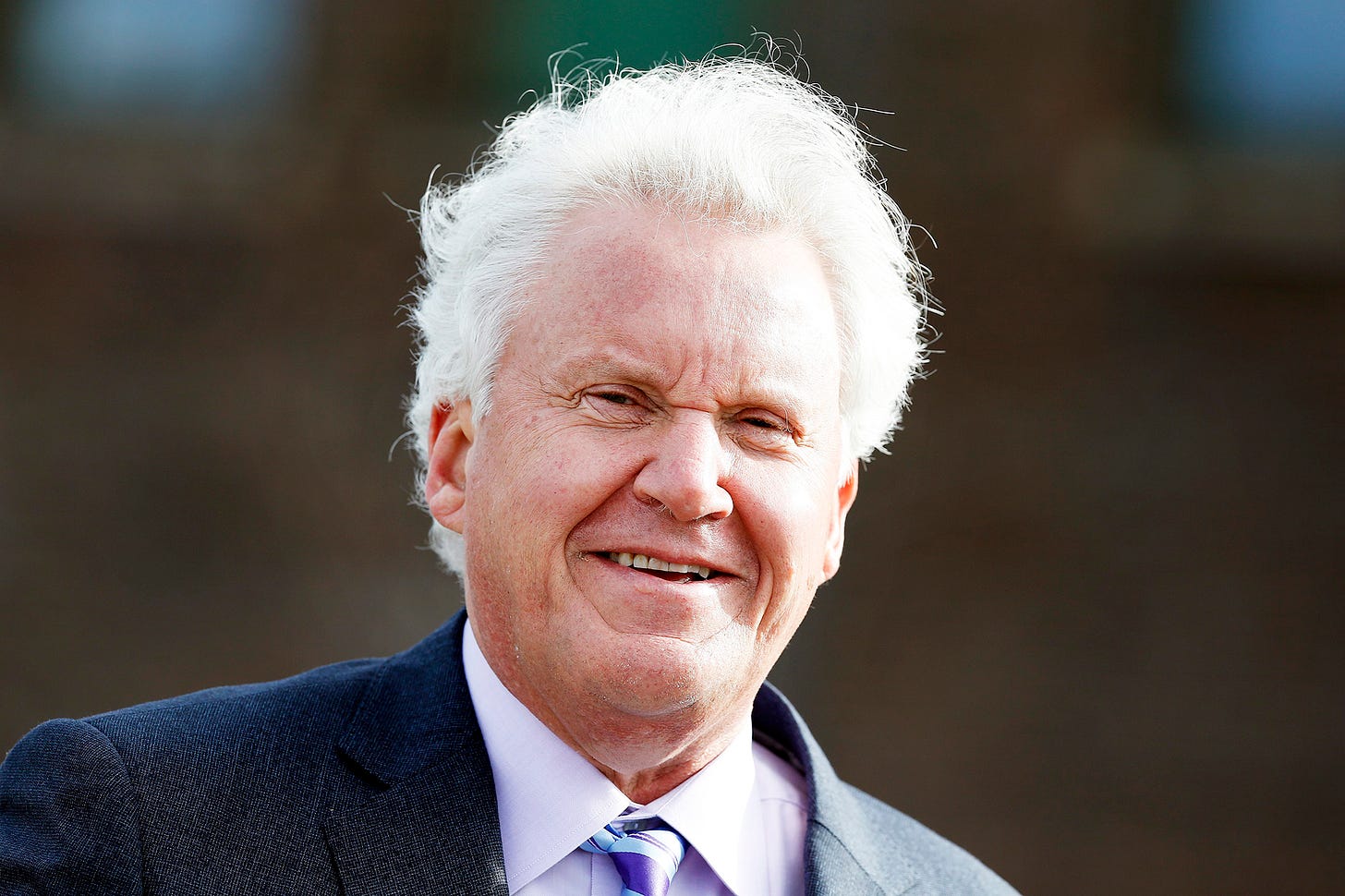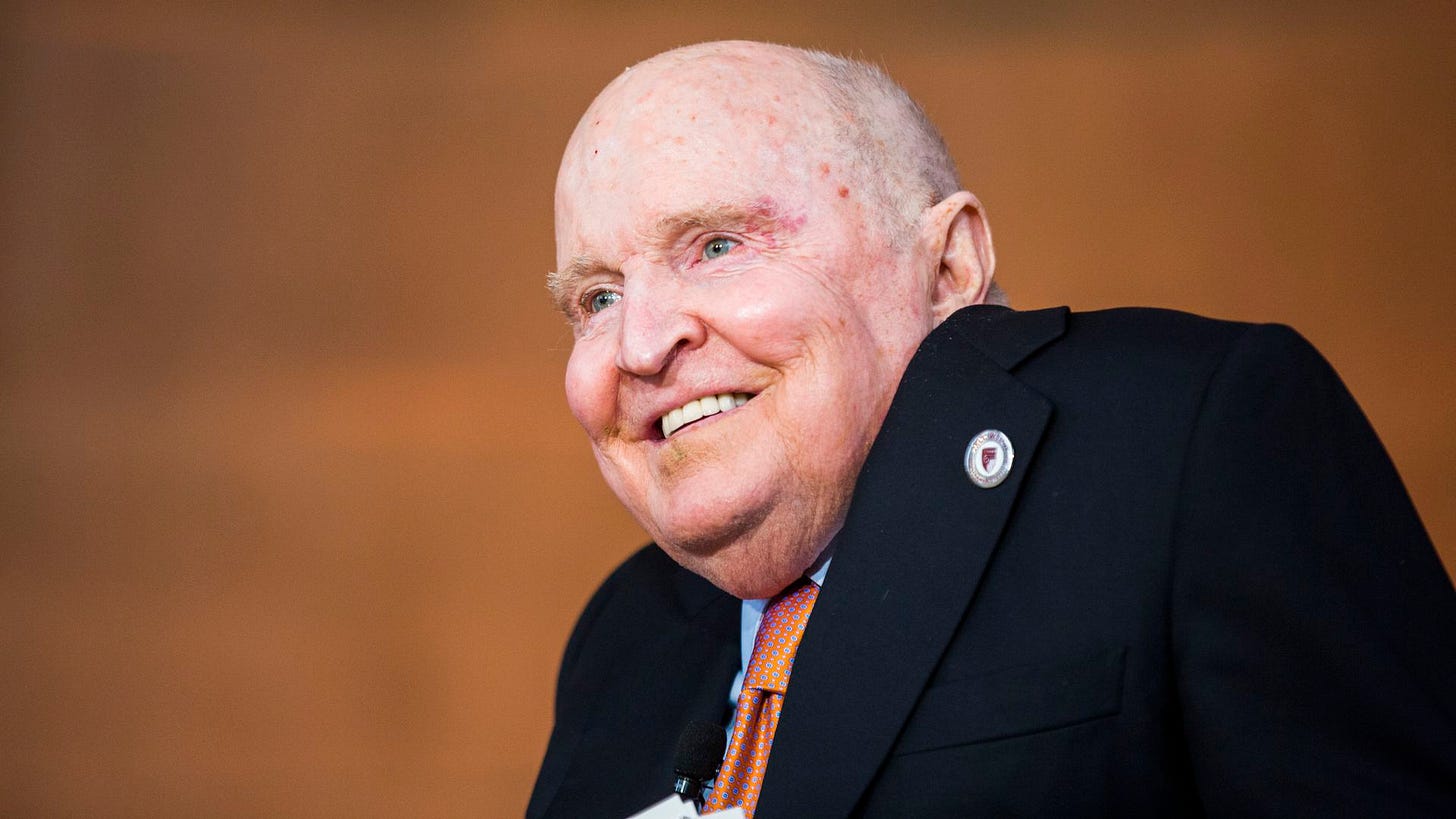Jeff Immelt Whines
Releasing a new book the former G.E. CEO, who ran the business into the ground, blames everybody besides himself.
I’ve been reading reviews of Jeff Immelt’s new book and realized the guy has no shame. Among other things, I write bestselling business school cases. Students tend to prefer cases where an entrepreneur overcomes enormous odds and builds a giant business. Jobs comes back to Apple and rebuilds it. Bezos takes over the world. Marvel emerges from bankruptcy with high-interest debt and rebuilds the business. They’re inspirational fun-to-read educational narratives. But there’s another type of case, failures. These are cases where, for some reason or another, everything went wrong, the 50-car pileups. Immelt’s tenure at G.E. has the potential to be recognized as one of the worst ever for a firm that wasn’t entirely destroyed.
Please subscribe to this newsletter:
In October and November 2008, about seven years into Jeff Immelt’s tenure as CEO of G.E., the behemoth business received twelve secret government bailouts. Specifically, G.E. begged for and received 12 short-term IOUs from the Federal Reserve. The specific type of financial instrument is usually used by large businesses to pay employees. It’s fair to say that G.E., which had strayed from making generators into making green from exotic financial instruments, needed emergency cash to make payroll.
Once it became public, thanks to Congress, criticism about G.E.’s bailout often focused on the conflict of interest since Immelt was on the Federal Reserve’s Board of Directors at the time. That overlooks a deeper problem: the maker of lightbulbs, locomotives, fridges, and electrical generation equipment played with money so recklessly they apparently ran out of it for their most pressing single responsibility, paying the employees.
Immelt took over as G.E. CEO from Jack Welch on September 10, 2011, the day before 9/11. At the time, G.E. was arguably the most admired company in the world with a market capitalization that reflected that status. Cutting to the end, he was unceremoniously fired in 2017 after years of poor performance, stock price declines, and behavior more suited towards royalty than the head of a public company. A year later, GE was dumped as one of the thirty companies in the Dow Jones Industrial Average Index, a slot they’d held since 1896 when the index was formed except for a brief period about 120 years ago.
Pundits often cite Jack Welch, Immelt’s predecessor, as the greatest CEO ever despite that less than a decade after his retirement Welch’s company was groveling for an emergency government handout. It’s almost impolite to point out that Welch’s magic ability to beat Wall Street estimates for 100 consecutive quarters seemed like “a very low probability of that ever occurring in nature” as forensic accountant Jay Huck put it.
Welch, Forbes’ “Manager of the Century,” repeatedly wrote bailouts were fine for banks and big businesses but a no-no for everybody else. People struggling with G.E.’s 30-percent interest rate credit-cards his firm freely gave out deserved nothing at all, personal responsibility being for everybody else. “Neutron Jack” — his nickname because he’d leave the buildings empty by firing the people or outsourcing them — was arguably largely responsible for Immelt’s eventual meltdown.
Given that, it’s odd that Immelt blamed everything and everybody besides Welch for his failure. The mess Welch left behind with creative accounting, using the corporate treasury of an industrial and media business as a bank, and an environment that reduced people to fungible numbers is what ailed GE. Immelt inherited a patient with Stage 4 cancer thanks to a three-pack-a-day habit for twenty-five years and refused to even suggest out loud that might be the problem.
When asked what went wrong Immelt answered G.E. Capital (correct), tough energy markets (not really - others made plenty of money), and poor execution by a GE executive named Steve Bolze, the former head of the power division. I have a French bulldog who has an inexplicable hatred towards hedgehogs; Immelt seems to feel the same about Bolze. Granted, Bolze apparently believed Immelt should be fired but anybody with common sense felt the same way. Besides, Immelt was Bolze’s boss. If Bolze underperformed, and Immelt did nothing, the fault is all Immelt’s.
Immelt also blames COVID, which came along about three years after he was fired. “You add those three things up, and you had Covid on top of that, you get a $10 stock price or whatever it is today. Not that I’m blameless, but I’d hang on those three things,” Immelt said.
At least he doesn’t consider himself entirely blameless. However, he never discusses some obvious problems. For example, some might argue that flying with not one but two private jets — his primary jet and an empty one that followed in case the primary one broke down — may have contributed to GE’s problems.
Besides being expensive, environmentally wasteful, and outrageous optics, the two-jet rule made sure Immelt never rubbed elbows with ordinary folk who might be flying commercial (albeit first-class) and might have the gall to speak to him. That refusal to listen — a knee-jerk aversion towards hearing something he might disagree with — speaks volumes about what ailed GE.
The ridiculous excuses G.E. came up with, arguing Immelt needed a second jet to return quickly from a trip to China and South Korea — cause, like, there’s no jets in those countries — compound his inability to simply admit he was wrong. Arguing he never authorized the second jet is insults our intelligence like he injured stockholders: flight plans showed them flying together so he’d see the second jet outside the window. A vaguely inquisitive or marginally paranoid executive might have asked “why is that other plane always following us?”
While Immelt was flying around with two jets, many of his GE customers were flying high with the stress of high-interest G.E. debt. G.E. Capital Retail Bank, a wholly-owned division of G.E. Capital, was forced to pay a record $225 million by the Consumer Financial Protection Bureau in 2014 for deceptive marketing and discrimination.
Apparently, while the firm was paying workers with government bailout money they were lying to their own credit-card customers, implying the working stiffs were eligible for similar terms offered by Uncle Sam. The Bureau found that G.E.:
Used telemarkets to sell credit-cards as free of charge when, in fact, the free money offers were under very specific conditions that and virtually never came about.
Sold debt cancellation products consumers were ineligible for because they were retired or disabled.
Sold new financial products to existing customers under the guise of “upgrading” an existing account free of charge.
Marketed financial products as a limited-time offer when they weren’t. OK - I’ll admit that scam remains so ubiquitous I didn’t realize it’s illegal though apparently, it is.
They also offered to settle bad debt to English speakers but refused the same to Spanish speakers. Not nice.
None of this is especially surprising. Sometime around the fiftieth or sixtieth quarter, that Welch announced he beat the street by a penny or two it was reasonably clear something smelled off. Madoff did essentially the same thing, announcing small gains month-after-month, quarter-after-quarter, and he was widely praised and respected right up until the paddywagon came. Maybe if the government had bailed him out he’d still be running his Ponzi scheme to this day.
Reading Immelt’s interview in this context is disquieting and honestly infuriating: “I worked 24 hours a day, seven days a week,” he told the New York Times. “And I was going to do that whether you paid me $5 million or $10 million.” He would’ve kept on slaving away, like an ordinary working stiff, for a measly $5 million per year. Righteous!
Quotes like this make me wonder if Jeff realizes there are people who work a lot of hours and, thanks go gig-work, aren’t even paid minimum wage but need to feed and shelter their families. Somehow, I’m pretty sure the man who made sure never to rub elbows in first-class doesn’t much care.
An industrial psychologist once taught me that trust requires competence, honestly, reliability, and caring. Immelt flunks on all four and GE’s failure was, in hindsight, entirely predictable.
If you’re feeling masochistic, here’s a link to Immelt’s book “Hot Seat: Hard-win Lessons in Challenging Times.”
If you want a better idea of what happened, here’s a link to the far better “Lights Out: Pride, Delusion, and the Fall of General Electric” by Thomas Gryta and Ted Mann.
Please subscribe to this newsletter:
And, if you like this post, please consider sharing it:



